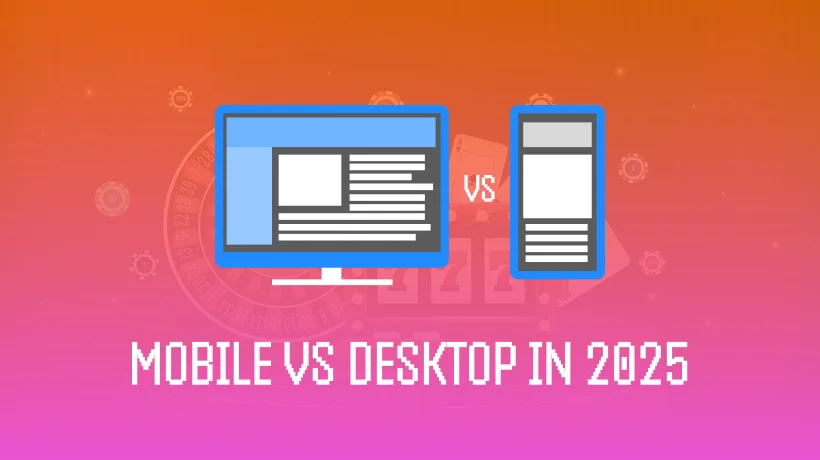It’s not even close anymore. Mobile devices now handle between 54% and 82% of all online gambling traffic, depending on which market you’re looking at. In the UK, 82% of online gambling happens on phones. In Africa, that number hits 91%. Even in the United States, where legal sports betting only expanded recently, over 80% of bets come through smartphones.
So why did mobile take over so completely? Three big reasons: it’s far more convenient, the technology finally works properly, and mobile platforms offer features that desktop simply can’t match.
Desktop isn’t dead, but it’s becoming a niche platform. The real question now isn’t if mobile dominates, it’s why the shift happened so fast and what it means going forward.
It’s All About Convenience
Bet Anywhere, Anytime
The biggest reason mobile gambling exploded isn’t complicated, it’s about access. Desktop betting requires you to be somewhere specific: at home, in front of a computer, with time set aside. Mobile betting just requires your phone.
That difference matters more than you might think. With desktop, betting was something you planned to do. You’d sit down after work, browse games, place your wagers. With mobile, betting fits into the gaps of your day. Commuting? Place a bet. At lunch? Check your wagers. Watching the game at a bar? Bet on the next play. Lying in bed? Add a few more picks.
Research from the International Journal of Mental Health and Addiction captured this perfectly through user interviews. One bettor explained: “I have my mobile, and if any matches are going to happen, the notification will come, and then I just open the phone…then I bet immediately.”
Another said: “I just think of something, or I see something, or if I hear someone talking about a game…So I will just take my phone out [and bet].”
Fits Into Daily Life, Not Disrupts It
The numbers show how dramatically this convenience changed behavior. Mobile users now engage with betting apps 5.2 times per day on average. Desktop users? Just 1.3 times daily. That’s a 400% increase in how often people interact with betting platforms.
Speed plays a huge role too. Modern mobile apps let you place a bet in under 15 seconds from thought to confirmation. Swipe, tap odds, confirm, done. Desktop requires navigating to a website, logging in, finding your bet, filling out bet slips. All while sitting at a computer.
This convenience particularly drives live betting. The UK Gambling Commission found that 74% of in-play bettors use mobile phones to gamble during games. That makes sense, if you’re watching a match and want to bet on the next goal, you’re not running to your computer. You’re pulling out your phone right there.
| Usage Pattern | Desktop | Mobile |
|---|---|---|
| Average sessions per day | 1.3 | 5.2 |
| Time to place bet | 30-45 seconds | Under 15 seconds |
| When used | Evening hours (planned) | Throughout day (spontaneous) |
| In-play betting usage | 26% | 74% |
The convenience advantage isn’t subtle. Mobile transformed betting from an occasional evening activity into something people do spontaneously throughout their day.
The Tech Finally Caught Up
Wanting to bet on mobile is one thing. Actually being able to do it well is another. For years, mobile gambling was clunky, slow connections, security headaches, payment friction. Three major technology breakthroughs changed everything.
5G Changed Everything
Early mobile betting suffered from a basic problem: networks weren’t fast enough. Trying to watch live dealer games on 3G or even 4G meant choppy video, delays, and frustration. 5G fixed that.
5G networks deliver speeds up to 100 times faster than 4G, with latency reduced to just a few milliseconds. That’s not a minor upgrade—it’s the difference between jerky, delayed streams and crystal-clear live casino games running smoothly on your phone.
Speed matters enormously for live betting. When odds change second-by-second during a game, a few milliseconds of delay can mean missing the bet you wanted. What used to require a wired internet connection and a powerful computer, high-definition live dealer games, multiple video streams, complex graphics, now works seamlessly on a smartphone.
Industry experts predict 5G will add 30% to mobile gambling revenue by 2025 as adoption spreads. North America already leads with 55% 5G coverage, and other regions are catching up fast.
Security Got Easier (and Better)
Early mobile betting had a security problem. Typing complex passwords on a tiny screen was annoying. Remembering different login credentials for multiple sites was worse. Multi-step verification slowed everything down.
Fingerprint scanning and Face ID solved this completely. Now you log into betting apps in seconds with just a touch or glance. Here’s the thing, biometric authentication is actually more secure than traditional passwords.
The numbers prove how well this works. 92% of US mobile wallet transactions now use biometric security through Apple Pay and similar services. Major platforms like Bet365, William Hill, and LeoVegas have all added biometric login. Users feel far more confident depositing money with a fingerprint confirmation than typing credit card details into a form.
Paying Became Effortless
Even if you could bet on mobile easily, getting money into your account was a hassle. Typing 16-digit card numbers on a phone keyboard? Nobody wants that.
Mobile wallets eliminated this friction entirely. Apple Pay, Google Pay, PayPal, and Neteller enable deposits in literally two taps using pre-saved payment methods. The scale of adoption is massive: Apple Pay alone has 744 million users globally and processes $6 trillion in payments annually.
The gambling industry went even further. 30% of all gambling wagers now use cryptocurrency, up from 20% just two years ago. The vast majority of crypto betting happens on mobile devices, with the mobile gambling market processing $81.4 billion in crypto revenue in 2024 alone.
What Changed:
- Before: Type card numbers, remember passwords, wait for 3G to load
- After: Touch fingerprint, tap Apple Pay, bet on 5G in seconds
The combination of fast networks, easy security, and frictionless payments removed every technical barrier that once made mobile inferior to desktop.
Mobile Has Features Desktop Can’t Match
Mobile gambling isn’t just a smaller version of desktop betting. It has unique features that desktop simply can’t replicate, and these features drive much higher engagement.
Notifications Keep You Coming Back
Push notifications might seem like a small thing, but they’re incredibly powerful. Research analyzing 63 million app users found that push notifications create 800% higher app retention rates for users who receive at least one daily. Users who opt into notifications show 171% more total engagement with betting apps compared to those who don’t.
Betting platforms use these strategically. You get alerts when odds change on games you’re following, notifications when your favorite teams are playing, reminders about promotions, and real-time updates on your active bets. These notifications bring you back to the app multiple times throughout the day.
The impact is clear: betting platforms that effectively use push notifications see users return 5+ times per day rather than the 1-2 times typical for desktop websites. That increased frequency translates directly to more bets placed.
Live Betting Was Made for Mobile
While you can technically do live betting on desktop, the experience is fundamentally mobile-first. Live or in-play betting, placing wagers during a game as it happens, has become one of the fastest-growing segments. It now represents 47% of all sports bets in 2024.
The connection to mobile is obvious. If you’re watching a football match and want to bet on the next goal scorer, you’re not leaving the room to find a computer. You’re pulling out your phone.
Top apps like DraftKings and FanDuel now offer integrated live streaming with synchronized betting, so you can watch games and place bets without switching apps. Bet365’s in-play system processes over 100,000 odds changes per minute during major sporting events. That kind of real-ti





